 Earlier this month, the Washington Post reported that “A petite, blond-haired, blue-eyed high school dropout who allegedly used the nickname Jihad Jane was identified Tuesday as an alleged terrorist intent on recruiting others to her cause… LaRose, who lived in suburban Philadelphia, allegedly recruited men and women in the United States, Europe and South Asia to “wage violent jihad,” according to an indictment issued in Pennsylvania.” It’s the latest example of an area in which I find myself treading particularly carefully on this site: female terrorists.
Earlier this month, the Washington Post reported that “A petite, blond-haired, blue-eyed high school dropout who allegedly used the nickname Jihad Jane was identified Tuesday as an alleged terrorist intent on recruiting others to her cause… LaRose, who lived in suburban Philadelphia, allegedly recruited men and women in the United States, Europe and South Asia to “wage violent jihad,” according to an indictment issued in Pennsylvania.” It’s the latest example of an area in which I find myself treading particularly carefully on this site: female terrorists.
I don’t want anyone to think that I advocate, in any way, “real” violence; long-time readers will know of the issues even the perception of such has caused in the past, and I dread to think how many alarms went off in Homeland Security with the Googling required for this piece! But there is still something transgressively – if not appealing, let’s go with “intriguing” – about the concept of a woman resorting to violence for political or social reasons. It seems such a contradiction, for the supposedly-gentler sex, the one which nurtures life, to use such means, that it demands further investigation. Of course, the word “terrorist” is more than somewhat laden with underlying meaning. In reality, the line between “terrorist” and “freedom fighter” is one largely determined by whether or not you support the regime under attack, and the historical record tends to be written by the winners in such struggles. I draw no such lines here: I am more interested in the people in question than the causes they espouse.
What follows is a selection of some of the interesting characters from history, starting more than 130 years ago, and going almost to the present day. I have deliberately excluded suicide bombers from the list, even though these have played an important part in history – for instance, it was a female Tamil Tiger who killed former Indian prime minister Rajiv Gandhi in 1991. It just doesn’t seem as interesting to me, to blow yourself up for a cause, when compared to a longer-term commitment to it. I have also excluded some obvious names: Palestinian Leila Khaled, because she has been covered before on the site – and will be covered again in the future, since her autobiography is on my reading list – and also Patty Hearst, since it seems questionable whether she was truly acting of her own volition.

 1. In the late 19th century, a number of women were among the active leaders of the Russian nihilist organization Narodnaya Volya (People’s Will), best known for their assassination of Czar Alexander II in 1981. That was organized by a woman, Sophia Perovskaya, with another female member of the Executive Committee, Vera Figner (left) also participating. Four years previously, Vera Zasulich (right) shot and seriously wounded Colonel Theodore Trepov, the hated governor of St. Petersburg.
1. In the late 19th century, a number of women were among the active leaders of the Russian nihilist organization Narodnaya Volya (People’s Will), best known for their assassination of Czar Alexander II in 1981. That was organized by a woman, Sophia Perovskaya, with another female member of the Executive Committee, Vera Figner (left) also participating. Four years previously, Vera Zasulich (right) shot and seriously wounded Colonel Theodore Trepov, the hated governor of St. Petersburg.
2. Daughter of an English baronet, and married to a Polish count, Constance Markiewicz was an unlikely revolutionary. But her political commitment, to causes including women’s suffrage and Irish independence, was deep. She was a Lieutenant in the Irish Citizen’s Army and during the 1916 Easter Rising, Markiewicz was appointed second in command at St Stephen’s Green in Dublin She supervised the setting-up of barricades, and was in the middle of the fighting, wounding a British army sniper. After being released from prison, she became rhe first woman elected to the British Parliament, though did not take her seat.
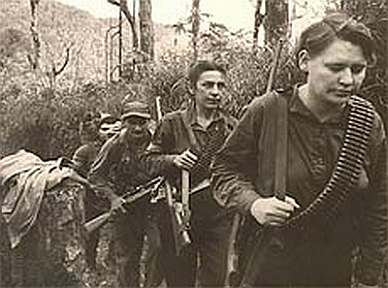 3. In Cuba, Celia Sánchez (right, with fellow revolutionary Haydée Santamaría) became one of the earliest members of the 26th of July Movement, joining the struggle after the coup against President Batista in 1952. After Fidel Castro was jailed, she became the rebel leader in the mountainous Sierra region of eastern Cuba, and was called by Castro, “the greatest guerrilla fighter and the most outstanding leader of the Cuban Revolution.” was one of the first women to assemble a combat squad during the revolution[. She was tasked with making all the necessary arrangements throughout the southwest coast region of Cuba, for the Granma landing, and was responsible for organising reinforcements once the revolutionaries landed.
3. In Cuba, Celia Sánchez (right, with fellow revolutionary Haydée Santamaría) became one of the earliest members of the 26th of July Movement, joining the struggle after the coup against President Batista in 1952. After Fidel Castro was jailed, she became the rebel leader in the mountainous Sierra region of eastern Cuba, and was called by Castro, “the greatest guerrilla fighter and the most outstanding leader of the Cuban Revolution.” was one of the first women to assemble a combat squad during the revolution[. She was tasked with making all the necessary arrangements throughout the southwest coast region of Cuba, for the Granma landing, and was responsible for organising reinforcements once the revolutionaries landed.
4. Considered a key figure in the Algerian struggle for independence from France, Hassiba Ben Bouali joined the FLN (National Liberation Front) while studying at the university in Algiers, and became the liaison officer of Ali La Pointe, deputy chief of FLN military operations for the city. She was active in the manufacture and transport of bombs around the city, as part of a campaign now known as the Battle of Algiers, which began on September 30, 1956 when Bouali and two other female FLNmilitants, carried out a series of bomb attacks on civilian locations. She was killed the following year when French forces bombed their hideout.
5. Tibetan Buddhist nun Ani Pachen fled to a monastery at age 17, after overhearing plans to marry her off, but returned in 1958 after her father died, inhering leadership of her clan. She led a guerrilla campaign, overseeing 600 fighters on horseback against the Chinese occupying forces and their tanks, which only ended with her capture in late 1959. She then spent the next 21 years in prison, and after her release in 1981, continued to protest against the Chinese occupation, until forced in exile in India. She said in a 2000 interview, “My father taught me to ride and to shoot. I used to race horses when I was a teenager. They didn’t have separate races for girls. I raced my horse against men.”
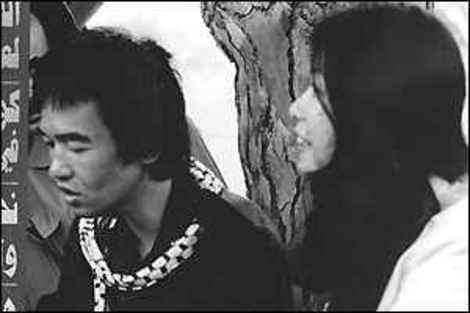 6. Fusako Shigenobu (left, with colleague Kozo Okamoto) was one of the founders and leaders of the Japanese Red Army. She is now serving 20 years for kidnapping embassy workers during a 1974 Japanese Red Army operation, she is also believed to have played key roles in other hijackings and bomb attacks. Reputedly ordered the murder, by burial alive, of a pregnant woman colleague for being “too bourgeois.” Another left-wing radical, Hiroko Nagata, while acting as vice-chairman of the United Red Army, directed the killing of 14 members of the group by beatings or hypothermia, during a 1972 purge. With friends like that, who needs enemies?
6. Fusako Shigenobu (left, with colleague Kozo Okamoto) was one of the founders and leaders of the Japanese Red Army. She is now serving 20 years for kidnapping embassy workers during a 1974 Japanese Red Army operation, she is also believed to have played key roles in other hijackings and bomb attacks. Reputedly ordered the murder, by burial alive, of a pregnant woman colleague for being “too bourgeois.” Another left-wing radical, Hiroko Nagata, while acting as vice-chairman of the United Red Army, directed the killing of 14 members of the group by beatings or hypothermia, during a 1972 purge. With friends like that, who needs enemies?
7. At only 22, Dora María Téllez was third in command for a 1978 operation which seized control of the Nicaraguan National Palace in Managua, taking the entire congress hostage and helping trigger the fall of the Somoza regime. The following year, Sandinista units under her control fought Somozan forces for six straight weeks, before finally capturing Leon, the second-largest city in Nicaragua. Subsequently became a respected historian, but as recently as 2004, was still barred from the United States as a terrotist.
8. Donna Maguire, once called Europe’s most dangerous woman, travelled to Europe in 1989 as part of an IRA active service unit, an is suspected by authorities of a bombing at a British Army barracks at Osnabruck on 19 June, the killing of a British soldier in a car bomb attack several days later, as well as the murders of two Australian tourists mistaken for off-duty soldiers, and a British soldier in Dortmund. Was eventually found guilty of attempted murder, explosives offences and spying on British Army bases in Germany with intent to sabotage. Sentenced to nine years, she was released immediately due to time spent in prison on remand. A family friend said of her: “She was an ordinary girl on the surface, but underneath she was as hard as nails.”
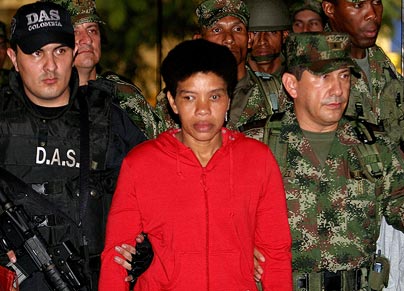 9. During their struggle for independence from Spain, Basque separatist group ETA had some infamous women members. These include Maria Dolores Gonzalez (“Yoyez”), who was later assassinated by the group as a reprisal for having left. Also high in their power structure was María Soledad Iparragirre, known as ‘Anboto’, whose exploits allegedly included the murder of a Spanish army Lieutenant and a car bomb explosion against a military bus, that killed seven.
9. During their struggle for independence from Spain, Basque separatist group ETA had some infamous women members. These include Maria Dolores Gonzalez (“Yoyez”), who was later assassinated by the group as a reprisal for having left. Also high in their power structure was María Soledad Iparragirre, known as ‘Anboto’, whose exploits allegedly included the murder of a Spanish army Lieutenant and a car bomb explosion against a military bus, that killed seven.
10. Nelly Avila Moreno, known as ‘Karina’, surrendered to Colombian authorities in 2008 (right), after a long career as a legend in the Revolutionary Armed Forces of Colombia (FARC). One army intelligence source said, “To become a FARC leader you have to been utterly ruthless and vicious, even more so if you are a woman. Karina was both.” As a result of her battles, she was blind in one eye, lost a breast, had bullet wounds along an arm and had combat scars on her face. The 45-year old was in charge of FARC’s 47th Front, which had up to 350 members operating in the northern province of Antioquia. Sentenced to 33 years in jail, she was released in 2009 to serve as a “promoter of peace.”
- The Baader-Meinhof Complex
★★★

Director Edel is probably best known in the West for the embarrassing Body of Evidence, though would rather be remembered for the much better, if incredibly depressing, Last Exit to Brooklyn. This is certainly nearer to the latter, depicting the rise and fall of the Baader-Meinhof group, also known as the Red Army Faction, the terrorist gang whose actions sent Germany into a state of nervous anxiety in the late 70’s. They started off at the end of the sixties, when Europe was in a state of political flux, but became more radical, engaging in bank robberies to fund their activities and then escalating to bombings, assassinations and kidnappings. The leaders were eventually caught – and I trust this isn’t much of a spoiler – dying mysterious deaths in jail, officially called suicide, but suspected by some as being extra-judicial execution.
It’s a generally interesting, but also flawed, approach to the subject matter, because it tries too hard to be even-handed, both humanizing the group, while also being sympathetic to the establishment they sought to bring down. It’s hard to do this, while still generating much emotion, because the viewer is left not really knowing for whom they should “root”. In addition, former journalist Ulrike Meinhof (Gedeck – the picture, above, is the real Meinhof) is initially the focus of the movie’s attention, but the way things unfold (and I’m manfully avoiding any spoilers there) mean that things inevitably have to shift away from her in the latter stages. The movie also faces the inevitable problem of any film based on actual events: reality rarely, if ever, follows a three-act structure, and as a result, either the facts or the drama have to suffer – here, it seems to be the drama, with the story not so much building to a climax as petering out.
That said, the performances are good, particularly Wokalek as Gudrun Ensslin, who has been described as the intellectual head of the RAF. What makes it suitable for inclusion here is the way that both Meinhof and Ennslin are depicted as the driving forces, the engine-room of the Red Army Faction. Andreas Baader (Bleibtreu – who was also the ineffectual boyfriend in Run Lola Run) is depicted as a hot-head, and something of a hypocrite, with a taste for fast cars. It’s clear that Ensslin and Meinhof are the ones that run the group – Baader was, in fact, a high-school dropout and one of the few RAF members who did not attend university. I have vague memories of hearing reports about the group as I grew up; while it was good to have the large blanks in my knowledge filled in, this felt more like a Discovery Channel re-enactment of the RAF’s history, rather than offering anything truly cinematic.
Dir: Uli Edel
Star: Martina Gedeck, Moritz Bleibtreu, Johanna Wokalek, Nadja Uhl
Continue reading →

 In the near(ish) future, Japan has become a post-apocalyptic wasteland in which only the strong survive. Initially, that does not include Milly (Mizuno), who is tortured by the Jack brothers and their gang: her baby is set on fire, while she has her breasts sliced off and is left for dead. However, she survives, albeit in a partially-mechanical form, and has now devoted her life to revenge on those responsible. Her artificial enhancements include a shotgun leg, a sword up her sleeve and a chest that… Well, that has to be seen to be believed, let’s just leave it at that, shall we? That’s Hard Revenge Milly, the first of the two films on the Western release DVD.
In the near(ish) future, Japan has become a post-apocalyptic wasteland in which only the strong survive. Initially, that does not include Milly (Mizuno), who is tortured by the Jack brothers and their gang: her baby is set on fire, while she has her breasts sliced off and is left for dead. However, she survives, albeit in a partially-mechanical form, and has now devoted her life to revenge on those responsible. Her artificial enhancements include a shotgun leg, a sword up her sleeve and a chest that… Well, that has to be seen to be believed, let’s just leave it at that, shall we? That’s Hard Revenge Milly, the first of the two films on the Western release DVD.




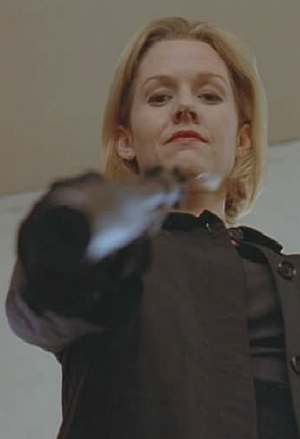 Ward (whom we’ll watch in anything, as payment for the enjoyment Tremors has given us) plays John McWhirter, a hard-bitten journalist with a fondness for the bottle, who is still trying to put behind him an incident when he was a young radical, that led to his friends being sent to jail for long terms, while John escaped doing time. He’s looking into the murder of an industrialist by Palestinian terrorists, when said friends show up, asking him to hide a woman (Ticotin) from the authorities for a few days, describing her as an activist in Shining Path, a Peruvian rebel group. Turns out she’s not who she seems, and it also turns out John had more to do with his friends’ arrests, thirty years ago, than it initially appeared. With enemies in the FBI, led by Robert Lecker (Plummer), an ally in the CIA, and a female assassin (Miller, right) out to tidy up all the loose ends, McWhirter has to decide whether to do what’s right, what’s easy, or what’s best for himself – and those might be three mutually exclusive options.
Ward (whom we’ll watch in anything, as payment for the enjoyment Tremors has given us) plays John McWhirter, a hard-bitten journalist with a fondness for the bottle, who is still trying to put behind him an incident when he was a young radical, that led to his friends being sent to jail for long terms, while John escaped doing time. He’s looking into the murder of an industrialist by Palestinian terrorists, when said friends show up, asking him to hide a woman (Ticotin) from the authorities for a few days, describing her as an activist in Shining Path, a Peruvian rebel group. Turns out she’s not who she seems, and it also turns out John had more to do with his friends’ arrests, thirty years ago, than it initially appeared. With enemies in the FBI, led by Robert Lecker (Plummer), an ally in the CIA, and a female assassin (Miller, right) out to tidy up all the loose ends, McWhirter has to decide whether to do what’s right, what’s easy, or what’s best for himself – and those might be three mutually exclusive options. With B-movie entrepreneur Roger Corman getting honoured at the Oscars earlier this month, it seems appropriate to pop on one of his classic productions, starring Dickinson, who was just about to become a star in one of the first shows with a female law-enforcement lead, Police Woman. The truth is, however, that this doesn’t have much more to offer beyond Dickinson: while she holds the film together with her steely resolve, and proves that sexy doesn’t stop at 40, the rest of it offers nothing as substantial. It’s a basic enough plot: she plays Wilma McClatchie, a single mom bringing up her two teenage daughters in Depression-era rural America. They fall into a life of crime, in part because they happen to be trying to cash a fraudulent check in a bank when it gets robbed by Fred Diller (Skerritt). They also team up with gentleman con-artist William Baxter (Shatner), but things go awry when they pull of their last big heist, kidnapping the daughter of a millionaire.
With B-movie entrepreneur Roger Corman getting honoured at the Oscars earlier this month, it seems appropriate to pop on one of his classic productions, starring Dickinson, who was just about to become a star in one of the first shows with a female law-enforcement lead, Police Woman. The truth is, however, that this doesn’t have much more to offer beyond Dickinson: while she holds the film together with her steely resolve, and proves that sexy doesn’t stop at 40, the rest of it offers nothing as substantial. It’s a basic enough plot: she plays Wilma McClatchie, a single mom bringing up her two teenage daughters in Depression-era rural America. They fall into a life of crime, in part because they happen to be trying to cash a fraudulent check in a bank when it gets robbed by Fred Diller (Skerritt). They also team up with gentleman con-artist William Baxter (Shatner), but things go awry when they pull of their last big heist, kidnapping the daughter of a millionaire. Earlier
Earlier 
 1. In the late 19th century, a number of women were among the active leaders of the Russian nihilist organization Narodnaya Volya (People’s Will), best known for their assassination of Czar Alexander II in 1981. That was organized by a woman, Sophia Perovskaya, with another female member of the Executive Committee, Vera Figner (left) also participating. Four years previously, Vera Zasulich (right) shot and seriously wounded Colonel Theodore Trepov, the hated governor of St. Petersburg.
1. In the late 19th century, a number of women were among the active leaders of the Russian nihilist organization Narodnaya Volya (People’s Will), best known for their assassination of Czar Alexander II in 1981. That was organized by a woman, Sophia Perovskaya, with another female member of the Executive Committee, Vera Figner (left) also participating. Four years previously, Vera Zasulich (right) shot and seriously wounded Colonel Theodore Trepov, the hated governor of St. Petersburg. 3. In Cuba, Celia Sánchez (right, with fellow revolutionary Haydée Santamaría) became one of the earliest members of the 26th of July Movement, joining the struggle after the coup against President Batista in 1952. After Fidel Castro was jailed, she became the rebel leader in the mountainous Sierra region of eastern Cuba, and was called by Castro, “the greatest guerrilla fighter and the most outstanding leader of the Cuban Revolution.” was one of the first women to assemble a combat squad during the revolution[. She was tasked with making all the necessary arrangements throughout the southwest coast region of Cuba, for the Granma landing, and was responsible for organising reinforcements once the revolutionaries landed.
3. In Cuba, Celia Sánchez (right, with fellow revolutionary Haydée Santamaría) became one of the earliest members of the 26th of July Movement, joining the struggle after the coup against President Batista in 1952. After Fidel Castro was jailed, she became the rebel leader in the mountainous Sierra region of eastern Cuba, and was called by Castro, “the greatest guerrilla fighter and the most outstanding leader of the Cuban Revolution.” was one of the first women to assemble a combat squad during the revolution[. She was tasked with making all the necessary arrangements throughout the southwest coast region of Cuba, for the Granma landing, and was responsible for organising reinforcements once the revolutionaries landed. 6. Fusako Shigenobu (left, with colleague Kozo Okamoto) was one of the founders and leaders of the Japanese Red Army. She is now serving 20 years for kidnapping embassy workers during a 1974 Japanese Red Army operation, she is also believed to have played key roles in other hijackings and bomb attacks. Reputedly ordered the murder, by burial alive, of a pregnant woman colleague for being “too bourgeois.” Another left-wing radical, Hiroko Nagata, while acting as vice-chairman of the United Red Army, directed the killing of 14 members of the group by beatings or hypothermia, during a 1972 purge. With friends like that, who needs enemies?
6. Fusako Shigenobu (left, with colleague Kozo Okamoto) was one of the founders and leaders of the Japanese Red Army. She is now serving 20 years for kidnapping embassy workers during a 1974 Japanese Red Army operation, she is also believed to have played key roles in other hijackings and bomb attacks. Reputedly ordered the murder, by burial alive, of a pregnant woman colleague for being “too bourgeois.” Another left-wing radical, Hiroko Nagata, while acting as vice-chairman of the United Red Army, directed the killing of 14 members of the group by beatings or hypothermia, during a 1972 purge. With friends like that, who needs enemies? 9. During their struggle for independence from Spain, Basque separatist group ETA had some infamous women members. These include Maria Dolores Gonzalez (“Yoyez”), who was later assassinated by the group as a reprisal for having left. Also high in their power structure was María Soledad Iparragirre, known as ‘Anboto’, whose exploits allegedly included the murder of a Spanish army Lieutenant and a car bomb explosion against a military bus, that killed seven.
9. During their struggle for independence from Spain, Basque separatist group ETA had some infamous women members. These include Maria Dolores Gonzalez (“Yoyez”), who was later assassinated by the group as a reprisal for having left. Also high in their power structure was María Soledad Iparragirre, known as ‘Anboto’, whose exploits allegedly included the murder of a Spanish army Lieutenant and a car bomb explosion against a military bus, that killed seven.
 This feels more like a mid-season episode of Alias than anything else, and not much more than a filler episode at that. I say this, because so little effort is put into developing the characters, it’s as if the makers reckon everything had already been established in the previous seven installments. And since there
This feels more like a mid-season episode of Alias than anything else, and not much more than a filler episode at that. I say this, because so little effort is put into developing the characters, it’s as if the makers reckon everything had already been established in the previous seven installments. And since there 
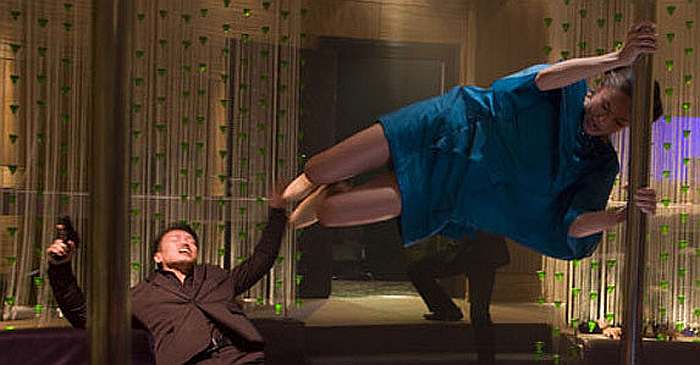 ★½
★½ I usually have no problem going on about GWG movies at some length. Hell, I even managed 750 words on DOA: Dead or Alive, and for that one, I had to re-read my review to remember what it was about. But when I got to the end of Street Fighter: The Legend of Chun-Li, my first thought was, “What the hell am I going to write about this?” It seemed likely the only way I’d get to 750 words, would be by repeating the title one hundred and twenty-five times. For the film is ill-conceived, poorly cast, badly written and directed by the man who managed to make Jet Li look bad, not once but twice, in Romeo Must Die and Cradle 2 the Grave.
I usually have no problem going on about GWG movies at some length. Hell, I even managed 750 words on DOA: Dead or Alive, and for that one, I had to re-read my review to remember what it was about. But when I got to the end of Street Fighter: The Legend of Chun-Li, my first thought was, “What the hell am I going to write about this?” It seemed likely the only way I’d get to 750 words, would be by repeating the title one hundred and twenty-five times. For the film is ill-conceived, poorly cast, badly written and directed by the man who managed to make Jet Li look bad, not once but twice, in Romeo Must Die and Cradle 2 the Grave. And I believed Street Fighter II was a fighting game. Silly me. It’s far too talky: all mouth and no trousers, to borrow a good ol’ British phrase. The fights themselves, choreographed by Dion Lam, aren’t bad, though the welding of some of the Street Fighter moves into the game doesn’t work – Chun-Li’s Spinning Bird Kick, for example, just looks silly. But otherwise, they aren’t awful; there’s a nice brawl in a bathroom between our heroine and Bison’s henchwomen. However, particularly in the first hour, there just aren’t enough of them, and what should be a fast-paced slugfest becomes bogged down as Chun-Li meanders her way, with a somewhat concerned expression, around the slums of Bangkok [which actually look surprisingly liveable. You want real slums, try Mumbai].
And I believed Street Fighter II was a fighting game. Silly me. It’s far too talky: all mouth and no trousers, to borrow a good ol’ British phrase. The fights themselves, choreographed by Dion Lam, aren’t bad, though the welding of some of the Street Fighter moves into the game doesn’t work – Chun-Li’s Spinning Bird Kick, for example, just looks silly. But otherwise, they aren’t awful; there’s a nice brawl in a bathroom between our heroine and Bison’s henchwomen. However, particularly in the first hour, there just aren’t enough of them, and what should be a fast-paced slugfest becomes bogged down as Chun-Li meanders her way, with a somewhat concerned expression, around the slums of Bangkok [which actually look surprisingly liveable. You want real slums, try Mumbai].